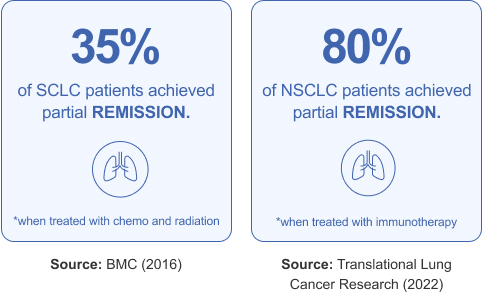Lung Cancer Remission
Oncologists consider lung cancer to be in remission when signs and symptoms of the cancer have decreased significantly or even disappeared. Remission can be partial or complete and last for varying amounts of time depending on each person’s diagnosis. If your lung cancer is linked to asbestos exposure, you may be eligible for financial compensation to pay for treatments that can help you achieve remission.
Can Lung Cancer Go Into Remission?
Yes, it is possible for lung cancer to go into remission.
 Doctors define remission as a span of time when signs and symptoms of the disease are no longer as serious or are completely gone.
Doctors define remission as a span of time when signs and symptoms of the disease are no longer as serious or are completely gone.
Remission is not necessarily considered a cure. This is because even in lung cancer remission, patients must continue to undergo routine screenings to monitor for recurrence (where the cancer has started to grow back).
There are three classifications doctors use to discuss lung cancer remission:
- Partial remission: The cancer may still be present but tumors have become smaller in response to treatment
- Complete remission: Physical exams, tests, and scans show that all signs of your cancer have disappeared
- Spontaneous remission: This occurs when cancer disappears on its own.
Lung cancer remission may be different for each type of lung cancer, but the best way to work towards remission is to get treatment as soon as possible.
These treatments might be expensive, but you may be eligible for financial assistance to help afford the costs. Get a free case review today to see how we can help.
- Access Financial Aid and Justice
- Learn About Your Options
- Contact Us for Free

Non-Small Cell Lung Cancer Remission
Non-small cell lung cancer (NSCLC) is the most common type of lung cancer, accounting for more than 80% of cases.
The cancer cells that make up NSCLC tumors are larger and often respond to surgical treatment better than small cell lung cancer. As a result, lung cancer remission is possible, and patients diagnosed in early and localized stages have a 5-year survival rate of 65%.
“Each year, tens of thousands of people are cured of NSCLC in the United States. And, some patients with advanced lung cancer can live many years after diagnosis.”
— American Society of Clinical Oncology (ASCO)
Up to 80% of NSCLC patients achieved at least partial remission when treated with an immunotherapy drug called Keytruda® (pembrolizumab) before surgery, as noted by a 2020 report from the journal Translational Lung Cancer Research.
Further, in a 2019 study from the journal Respiratory Research, 7.3% of patients with stage 3 NSCLC and 1.8% of those with stage 4 NSCLC achieved complete remission. While these numbers are low, it shows that remission is possible at any stage.
Small Cell Lung Cancer Remission
Small cell lung cancer (SCLC) or small cell carcinoma is a rare type of lung cancer that quickly spreads to the lymph nodes and other parts of the body. It accounts for 15% of lung cancer cases.
This type of lung cancer has a worse long-term prognosis than NSCLC because the cancer cells are incredibly aggressive. However, SCLC is highly sensitive to radiation therapy and chemotherapy treatments.
In a 2016 study from the medical journal BMC cancer, 35% of SCLC patients achieved full remission, and an additional 42% entered partial remission following a combination of chemotherapy and radiation treatments. Almost all of the remaining patients achieved disease stability, meaning the cancer didn’t shrink, but it also didn’t grow.
Unfortunately, SCLC is also more likely to return.
We can help you afford treatments that can increase your chances of lung cancer remission. Call (877) 446-5767 now to find out your eligibility.
Lung Cancer Recurrence After Remission
Lung cancer recurrence happens when the cancer comes back after treatment. Most lung cancer tumors recur within five years of treatment, but some can return many years later.
SCLC is much more likely to be recurrent than NSCLC. Over 90% of SCLC cases come back within two years, compared to approximately 60% of NSCLC cancer cases.
Your medical team will continue monitoring you for many years to identify signs of cancer returning and, from there, recommend treatments to help you.
Treatments to Achieve Lung Cancer Remission


First-line treatment, also considered initial therapy, usually involves surgery, chemotherapy, and/or radiation therapy. Second- and third-line treatments are used after initial treatments and often include gene therapy, immunotherapy, and other targeted therapies.
Learn about the main types of lung cancer treatment below.
Lung Cancer Surgery
During surgery, doctors remove any visible lung cancer tumors from the lungs. At times, doctors may need to remove some parts of the surrounding lung tissue.
Surgery is highly effective in early-stage NSCLC treatment and often can lead to lung cancer remission. While it is rarely used as the initial treatment for SCLC, doctors may perform this treatment if there is only one tumor present in the lung.
Patients in more advanced stages of NSCLC and SCLC may also receive minor lung cancer surgeries to help ease pain or other symptoms like fluid buildup in the lungs.
Lung Cancer Chemotherapy
Chemotherapy uses drugs to kill rapidly growing cancer cells. Whether used by itself or with other treatments as part of a multimodal treatment plan, chemotherapy can treat both SCLC and NSCLC.
Common chemotherapy drugs used for lung cancer treatment include:
- Carboplatin
- Cisplatin
- Paclitaxel
- Pemetrexed
Often, doctors might combine two different chemotherapy drugs as part of one cycle of treatment. Combination chemotherapy is often effective in putting lung cancer into complete remission, especially if the cancer is early stage.
Radiation Therapy
Radiation therapy or radiotherapy uses high-dose radiation to shrink tumors and kill cancer cells.
Some people manage to achieve permanent lung cancer remission with radiation therapy.
Immunotherapy
Immunotherapy uses immune-boosting drugs to help your immune system find and destroy cancer cells. Common types of immunotherapy include oncolytic virus therapy, monoclonal antibodies and immune checkpoint inhibitors, and T-cell therapy.
Immunotherapy can cause complete or spontaneous remission in some patients. For example, a 2021 study from Respiratory Medicine Case Reports revealed that two patients with a type of NSCLC, adenocarcinoma, achieved complete remission after taking immunotherapy drugs.
Multimodal Therapy
Cancer centers often use multiple treatments to help lung cancer patients achieve remission. This type of treatment strategy is called multimodal therapy.
In a 2020 Cureus study, a 71-year-old woman achieved complete remission after receiving radiation therapy, chemotherapy, and surgery to treat lung cancer that had spread (metastasized) to her brain. She remained cancer free for 9 years after the procedure.
Clinical Trials
Clinical trials are research studies with human volunteers that study new treatments to see how effective they are.
Some people with advanced-stage lung cancer are able to achieve remission after getting new treatments through these clinical trials.
For example, Nancy Hale, a stage 4 lung cancer patient, was told she had a 30% chance of surviving three years after receiving her lung cancer diagnosis. Six years after her diagnosis, Hale is in lung cancer remission due to a Dana-Farber Cancer Institute immunotherapy clinical trial.
The effectiveness of lung cancer clinical trials depends on many factors, including your age, health, medical history, and how your cancer reacts to certain treatments. Talk to your care team to learn more about clinical trials and whether they’re a good option for you.
You can also find out more about affording lung cancer treatments by getting a free case review from our team.
- Access Financial Aid and Justice
- Learn About Your Options
- Contact Us for Free



Factors That Influence Lung Cancer Remission
Each lung cancer diagnosis is different, and as a result, the chances of remission will vary for everyone. However, some factors may increase the likelihood of you entering lung cancer remission and remaining cancer free.
Factors that may affect lung cancer remission include:
- Age: Younger patients are typically more likely to enter remission because their bodies may recover faster after treatment and can withstand more intensive treatments.
- Lifestyle: Eating a healthy diet, performing low-intensity exercises like walking, getting enough sleep, and staying hydrated keep your body at its strongest to keep fighting the cancer.
- Overall health: Cancer is less likely to go into remission if you have poor health.
- Quitting smoking: Tobacco use can significantly increase pain and irritation in the lungs. Non-smokers tend to respond better to treatments and have less pain or other symptoms.
- Seeking emotional support and mental health care: Joining a lung cancer support group or receiving counseling may help you lower stress, allowing your body more resources to recover after treatment.
Finding Help Through Lung Cancer Treatment
Lung cancer remission and survival rates can be discouraging. Thankfully, there are resources available to help.
Lung Cancer Group can help you obtain compensation if you developed lung cancer as a result of asbestos exposure. Compensation that can help you pay for treatment life-extending treatment.
Call (877) 446-5767 to book a free consultation and learn more about your legal options.
FAQs About Lung Cancer Remission
Can lung cancer go into remission?
Yes, lung cancer can go into remission in some cases. Whether or not your cancer will go into remission depends on many factors, including your overall health, how your body responds to treatments, and more.
Your doctors will do all they can to help you live as long as possible with lung cancer and to achieve remission.
Can stage 4 lung cancer go into remission?
Yes, it is possible for stage 4 lung cancer to go into remission. In fact, Nancy Hale, a stage 4 lung cancer patient, went into remission for six years after getting immunotherapy in a clinical trial.
Further, 1.8% of stage 4 NSCLC patients went into remission in a 2019 study. The best way to achieve remission after a stage 4 lung cancer diagnosis is to get treated. Afford lung cancer treatments now: Call (877) 446-5767 to learn more.
When is lung cancer considered in remission?
Lung cancer is in remission when a patient has fewer or no symptoms and doctors can see that the cancer has shrunk or vanished on imaging scans.
There are two types of remission: partial and complete. Partial remission occurs when cancer tumors or the extent of cancer in the body have decreased, and complete remission occurs when all cancer signs and symptoms have disappeared.
Some patients also achieve “stable disease,” in which the cancer stops growing but also doesn’t shrink.
Does lung cancer come back after remission?
Lung cancer can often come back after remission. This is known as recurrence. Approximately 90% of SCLCpatients and 60% of NSCLC patients experienced a recurrence within two years.
Is there a cure for lung cancer?
Unfortunately, there is no cure for lung cancer at this time. However, many patients have achieved long-term remission and remained cancer-free for years thanks to treatment.
When is lung cancer most likely to recur?
Lung cancer is most likely to recur within 5 years after treatment. SCLC typically recurs much more quickly than NSCLC. Typically, SCLC will recur within 1 year after the first-line treatment method.

